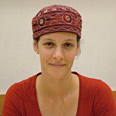
Efrat Shapira-Rosenberg
צילום: גבי מנשה
High class troubles
Uri Orbach shouldn’t complain about boring Gemara classes. After all, girls have it much worse
I confess that I read Uri Orbach’s column, “There’s more to life than Gemara” with a touch of jealousy. In an ideal world, I - as a woman who experienced the female version of Uri’s state religious education - should have been able to identify with his position.
At the very least, I should have been able to feel that we’re talking about two sides of the same coin. But in this case, separate is very far from equal.
During my twelve years in religious public schools, not once were we shown an authentic page of Gemara – the kind that appears in a fat tome, with Rashi and Tosefot on the sides and “Page B” in the back.
On the rare occasion when we were shown the “Amoraim’s commentary on the Mishnah”, it was only as a photocopy, with the relevant passage clearly notated, lest our eyes stray and we be tempted (God forbid) to continue reading ahead.
Our Judaic studies lessons did, in fact, include everything that Uri longs and hopes for: “The Kuzari”, “Path of the Just”, “Duties of the Heart”, the history of Hassidism, Bible with the commentaries, the early and the late Prophets, and much more. Everything – except Gemara, of course.
While the boys were busying trying to master forty Gemara folios for the matriculation exam, we dutifully memorized: “Moses received the Torah at Sinai and conveyed it to Joshua; and Joshua to the Elders; and the Elders to the Prophets; and the Prophets conveyed it to the Men of the Great Assembly.”
That’s where it ended for us girls. With the Men of the Great Assembly.
During that period, I was haunted by the idea that I was being cut off from the very Gemara which comprises the basis of our modern Orthodox lifestyle and which was passionately delved into by countless scholars throughout the generations. In those days, I would’ve given anything for the chance to fall asleep during a class on Tractate Brachot.
Thus, when I was finally released from the long arms of the educational system and after I paid my debt to society, I decided to plant myself in the so-called “tent of the Torah”. The current popularity of women’s seminaries had not yet taken off, and I was therefore forced to endure criticism, which – I’m very pleased to report – is quite unknown to today’s female scholars.
“What’s up with those yeshivas for girls?”; “Why do you always have to be like the boys?” and “Aren’t you worried that you’ll ruin your chances of finding a suitable husband?” These and other similar remarks were all once par for the course.
But I shrugged off the disapproving comments. It’s been thirteen years since I first entered the study hall, and as they say, it was the beginning of a beautiful friendship.
I dedicated the next few years of my life to learning Gemara seriously. This study immeasurably enhanced and greatly developed my knowledge of the Torah, my spiritual outlook, and my sense of belonging to the Jewish nation and the Orthodox community. However, it was a matter of “too little; too late”.
Today, as I well know, there has been a marked change in education for girls. Nevertheless, there remains a significant gap between the genders.
Female Gemara classes are still considered to be marginal at best, and those who promote them are branded as militant feminists.
Personally, this label doesn’t bother me. But I’m perturbed that we must continue to apologize for our choices and justify our actions. Moreover, we apparently haven’t yet finished proving that it’s halachically legitimate for women to study Gemara at all.
So, I hope my good friend Uri will forgive me if I note that his description of the yeshiva high schools comes across as high class troubles. In my world, “all Gemara - all the time” is still an unobtainable fantasy beyond my wildest dreams.










